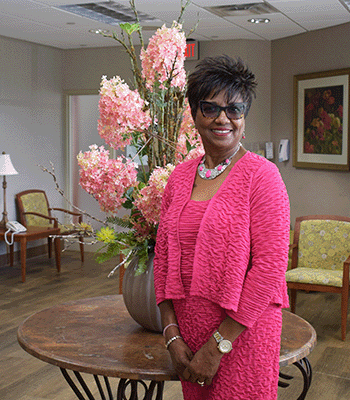Getting an annual mammogram was always important to Brenda Frierson. When she went to Maury Regional Medical Center (MRMC) for her yearly appointment in January of 2005, though, she found out just how important it was.
A spot in her left breast was suspicious enough that her doctor suggested she get a biopsy, and her worst fear was confirmed: it was cancer.
“When I was first diagnosed, I just knew that I was going to die,” Frierson said. “When you hear those three words — you have cancer — you just kind of get a sinking feeling. But I knew if it was at all possible, I was going to do everything possible to get rid of it and stay rid of it.”
Luckily, the cancer was found early, but Frierson had some decisions to make quickly about treatment.
She was put in touch with a general surgeon at MRMC who suggested Frierson have a mastectomy to take out the left breast tissue as well as a TRAM flap, a type of reconstructive surgery where a plastic surgeon takes muscle from the lower abdomen to reconstruct the breast.
“I wanted to do whatever needed to be done to remedy the situation,” she said. “I had a lot of stuff to think about and process all at once, but with my passionate and undying faith in God I was motivated to do whatever was necessary to be free of this disease. I never questioned God; I prayed about it. I talked to him about each and every procedure and surgery I had to undergo. After I prayed to him about it and got the answer, I understood the assignment.
“The plastic surgeon came in and said, ‘I’m going to take very good care of you.’ That did it for me. I wasn’t scared — just those reassuring words made a big difference.”
After the successful surgeries, Frierson underwent chemotherapy and radiation treatments. Her entire journey lasted from January of 2005 to August of 2006, when she moved into remission and on to her next chapter: helping others in their fight with breast cancer.
She’s been active ever since in breast cancer support groups at MRMC and is a Reach to Recovery volunteer.
“Being a volunteer helped me, too. Sometimes when you’re helping somebody else, they help you more than you help them,” she said. “I think it’s a duty to pass it on. To me, it makes me feel like I can contribute to good health for someone else. Someone cared for me when I was going through this, so I want to do the same to pay it forward to somebody else. It’s so rewarding to tell somebody that they can beat this.”
Whenever she tells the story of her journey through breast cancer, Frierson makes sure to stress getting annual mammograms for every woman 40 years of age and older.
The National Breast Cancer Foundation estimates one in eight women in the U.S. will develop breast cancer in their lifetime, and 65% of breast cancer cases are diagnosed at a localized stage, meaning the cancer hasn’t spread outside the breast. For localized breast cancer, the five-year survival rate is 99%.

“I always had my annual mammogram like clockwork,” Frierson said. “I tell all women who are age eligible to get their annual mammogram, especially women of color. Sometimes, we tend to not take care of ourselves because we’re busy taking care of others.
“Early detection is key. I was detected early, and I think that really helped me.”
She also stresses to women that they will get great care at MRMC.
“I had everything done at Maury Regional Medical Center, and I was really blessed with a good team,” she said. “I got the best care that I think anyone could have had at Maury Regional. Staying here at home was the best decision I could have made.”
To learn more about the breast cancer resources available through Maury Regional Health, visit MauryRegional.com/Breast-Health.
The Breast Cancer Support Group at MRMC meets on the third Monday of each month in the Women’s Center in the Pavilion (no meetings in July, August or December). Survivors, trained professionals and guest speakers come together to help provide support and solutions. For more details, call 931.540.4166 or visit the Classes & Events Calendar at MauryRegional.com.
More information on the Reach to Recovery volunteer program can be obtained by calling 931.388.6525 or 1.800.ACS.2345.